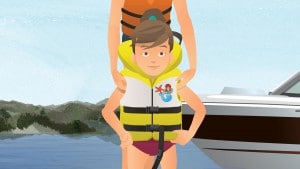North Carolina’s Life Jacket Laws
Life jacket laws vary from state to state. According to North Carolina’s life jacket laws, you are required to carry one Type I, II or III life jacket, of the appropriate size, for each person on board. Life jackets must be in good condition, and readily available on all recreational vessels. This includes motorized boats, as well a human-powered canoes, kayaks, rowboats. There are some exemptions for sailboards, racing shells, rowing skulls, racing canoes and racing kayaks.
In addition all boats that are 16 ft. in length or greater, must have one readily accessible Type IV, Coast Guard-approved personal flotation device (PFD) on board.
Requirements for Children
In North Carolina, boat passengers 13 years of age and under are required to wear a Coast Guard-approved life jacket when underway on any boat, unless they are in an enclosed cabin or below deck. ‘Underway’ does not include when the boat is anchored or tied to shore.
Personal Watercraft (PWC) Life Jacket Law
Any person operating or riding a personal watercraft (PWC) is required to wear a Coast Guard-approved life jacket. Inflatable life jackets are not permitted for use on PWCs.
Towed Sports Life Jacket Laws
Any person being towed behind a personal watercraft (PWC) is required to wear a Coast Guard-approved life jacket. inflatable life jackets are not permitted.
Note: In North Carolina, there are laws that require life jackets to be on board all boats operating on the Catawba River chain.
North Carolina’s Muffler and Noise Level Laws
Any boat with an open-air exhaust, that has the capacity to operate at more than 4000 RPM, is required to have an effective muffling device installed on each exhaust manifold stack. Licensed commercial boats are exempt from this requirement.
For more information about laws and regulations that apply to boaters in North Carolina, visit the North Carolina Wildlife Resource Commission.


